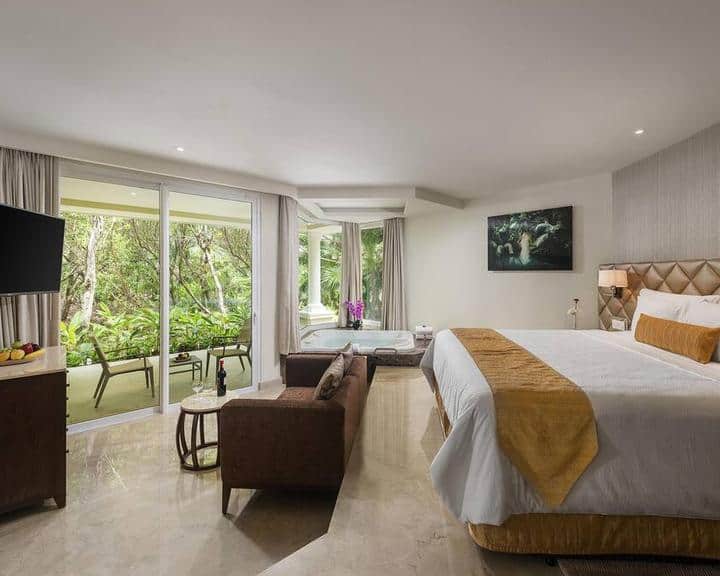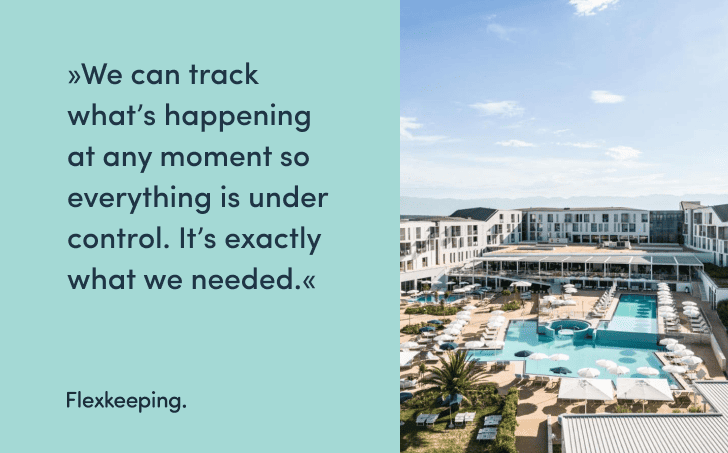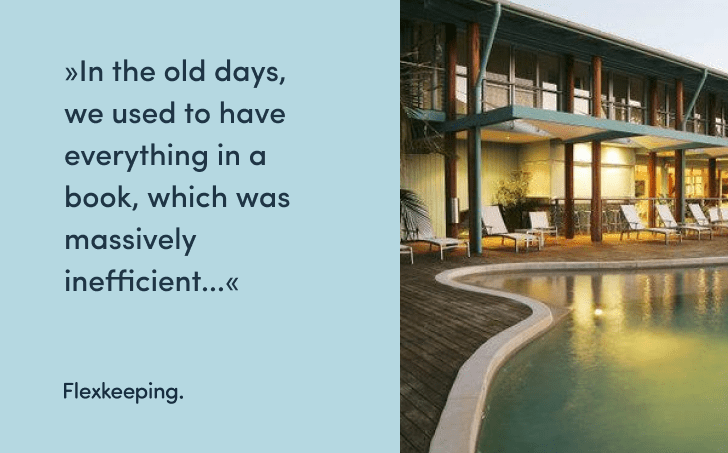Palace Resorts is a collection of nine five-star, all-inclusive oceanfront properties in Mexico and Jamaica. Their upscale, spacious accommodations offer nightly entertainment, state-of-the-art spas, and unparalleled service to satisfy even the most demanding needs. The sizes of their hotels go from a 169-room Cozumel Palace to Moon Palace, which counts over 3300 rooms.

Road to success: using automation to simplify complex tasks
There could be up to 150 housekeepers simultaneously working a single shift in the Palace Resorts’ biggest properties, making organization and team communication a real challenge. We spoke to the Corporate Rooms Division Manager, Magdalena Kazimierczak, about how they have transformed their operations with smart tech thanks to Flexkeeping‘s Hotel Operations Platform.

»We wanted to speed up and automate communication between departments so that our guests would get answers and services delivered as quickly as possible. Flexkeeping does all that and more.«
— Magdalena Kazimierczak,
Corporate Rooms Division Manager at Palace Resorts
Before Flexkeeping: frustrations and inefficiencies
Each of our properties can have up to 9 a-la-carte restaurants, a fully stocked minibar, an extensive room service menu, and hundreds of other services and offerings. Guests can easily order services with a bespoke mobile app, a 24h concierge, and a 24h telephone line. All of this results in operations that are very large and complex.
In our biggest property, up to 150 housekeepers and 25 housekeeping supervisors work during a single shift. Before Flexkeeping, organizing their daily cleaning schedule was a huge challenge. Their only software was our PMS - everything else was based on paper notes and phone calls. That translated to 12 housekeeping supervisors (each responsible for 100 rooms) having to create room lists for their housekeepers manually.
One guest relations center connected to every hotel picked up all requests. From there, the guest relations center would dispatch every request to the appropriate hotel and its departments. The process was only partially digitized - we would use the phone or try to find somebody in person. Operators had a tool where they recorded the orders for hotels to see them, but further automation still needed to be done.
After Flexkeeping: automation and collaboration
The communication is flowing much more quickly. Everyone knows what they’re supposed to do - we no longer have three people fixing the same maintenance issue. A housekeeper can take a picture, add the details and send the task to the maintenance department. We also optimized extra guest service requests, complaints, and all other internal communication between the departments. It has made work so much easier. Flexkeeping is the central ordering system, dispatching every order to the right hotel. It connects multiple departments to a chain of automated tasks to guarantee prompt delivery of every service request. It’s all wrapped into an SOP timeframe and automatically escalated if the service is not delivered within the required time. And because we integrated Flexkeeping with our Guest App, guests can report anything directly from their phones. The result was much faster response & service delivery times.
Day-to-day progress is automatically collected through the platform and integrated with our PMS. All the housekeeping supervisors must do is drag and drop the right rooms to the right housekeepers. Alternatively, they can automatically assign rooms with a single click.
»Organization would take multiple hours combining PMS reports, printed reports and other notes. With Flexkeeping, we could automate over 1 million room service deliveries per year.«
— Magdalena Kazimierczak,
Corporate Rooms Division Manager at Palace Resorts

Boosting productivity and the guest experience
Our housekeeping supervisors use digital checklists within Flexkeeping to optimize their room inspections. They use digital checklists to see how well the tasks were performed. The platform sends feedback to the designated housekeeper, who can promptly return to the room to fix the issue. Communication is automated so supervisors and housekeepers can plan their tasks optimally without losing time or sanity. We can now prevent any problems before the guests arrive and report them.
Housekeeping managers, supervisors and staff from other departments can see real-time cleaning progress and room status. Flexkeeping optimizes the workflow of the whole housekeeping department while increasing the speed and quality of other services. That saves us so much time and steps - team productivity is on a whole new level.
»If we know what the guests are asking for, we can deliver that service. That’s why we love that Flexkeeping gives us reports with the top 10 most frequent housekeeping tasks, maintenance issues and popular room service orders.«
— Magdalena Kazimierczak,
Corporate Rooms Division Manager at Palace Resorts

Becoming more strategic
Flexkeeping opened the possibility of in-depth analytics by offering one central system to dispatch and coordinate all room service orders. Thanks to analytics, hotels can see if all orders have been delivered within the standard 30 minutes, the most popular room service items, and even the current room service costs.
We track daily, weekly, and monthly details to ensure prompt delivery and high-service quality. It also enables us to adjust room service menus to meet and exceed guest expectations while optimizing material costs. Since we embraced Flexkeeping, our operations have become entirely automated and transparent.



